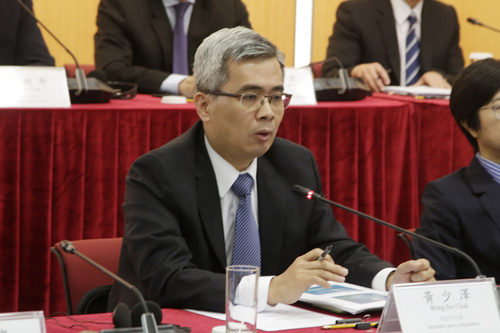 The Secretary for Security, Mr Wong Sio Chak, gives further details regarding measures planned to strengthen Macao’s response mechanism at today’s press conference.
The Secretary for Security, Mr Wong Sio Chak, gives further details regarding measures planned to strengthen Macao’s response mechanism at today’s press conference.
The Government is to set up a new bureau to handle matters relating to the alleviation of the effects of natural disasters and accidents and to handle the aftermath of any such emergencies.
The plan was announced today by the Secretary for Security, Mr Wong Sio Chak, at a press conference held by the Commission for Reviewing and Monitoring the Improvements of the Response Mechanism to Major Disasters.
The new body to be established – the Civil Protection and Emergency Coordination Bureau – is one of 11 measures involving either short-, medium-, and long-term initiatives that the Government planned to introduce so as to strengthen Macao’s response mechanism and coordination of relief work in the event of a crisis.
The enhancement of basic infrastructure to counter the risk of emergency; the strengthening of coordination work regarding the existing civil protection mechanism; and an increase in channels for distributing information during an emergency, were the strategies to be adopted in the short term in order to strengthen Macao’s ability to cope with any crisis that might occur.
In the long run, the Government planned to build a new centre on Macao peninsula for civil protection operations. The Government would dedicate more effort to promote public awareness of environmental risk and public education on self-help measures that could be taken during any disasters or community emergencies.
During today’s press conference, the Chief Executive and Commission members gave the public more information regarding the Government’s work in various fields regarding improvement of the response mechanism system in event of a crisis.
The Commissioner-General of the Unitary Police Service, Mr Ma Io Kun, gave further information regarding three phases for optimisation of the disaster response mechanism in Macao.
The first phase would include a visit to Macao – scheduled for this month – of experts from the National Commission for Disaster Reduction, in order to assist with optimising the disaster management system. The visiting team would include experts on crisis prevention and on mitigating the impact of disasters; advisors on meteorology, architecture, water resources, electricity supply, telecommunications, and rescue and relief work; experts on education regarding risk awareness; and advisors on formulating plans for crisis prevention and alleviating the impact of disasters. These professionals would also contribute to a Government report on the measures that were taken in response to Typhoon Hato.
The second phase of response optimisation, from late September to year-end, would include further research regarding possible improvements to the system for dealing with unforeseen events affecting the community.
The third phase would be to complete a mid- to long-term plan, covering the period 2019 to 2028 inclusive, regarding disaster prevention and mitigation.


